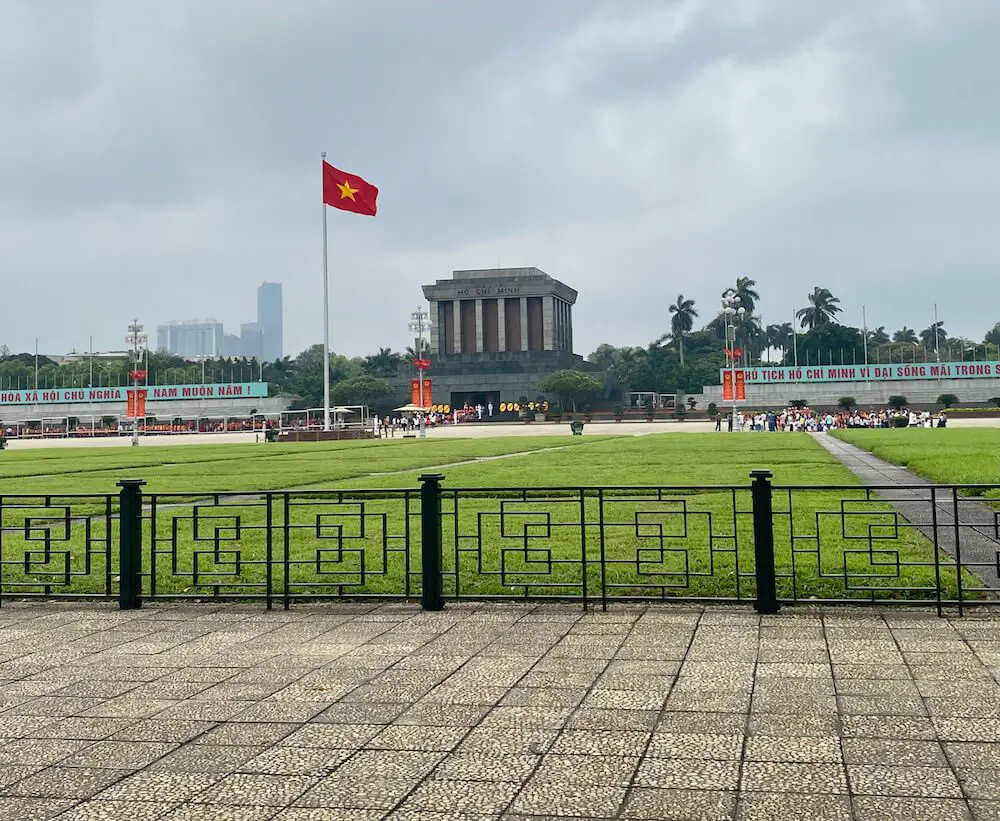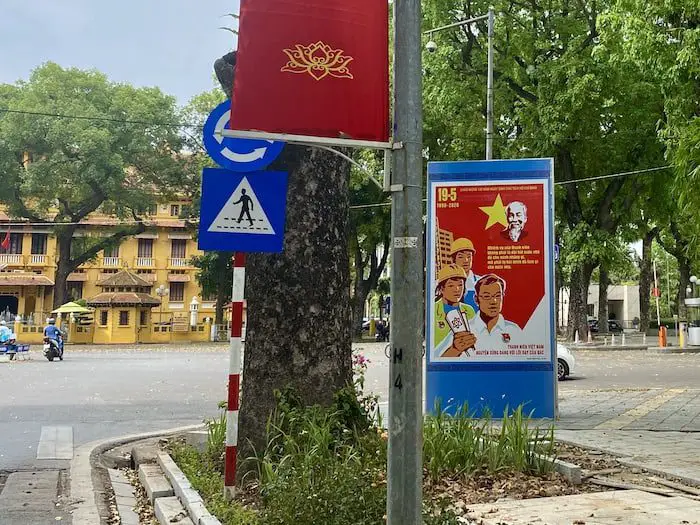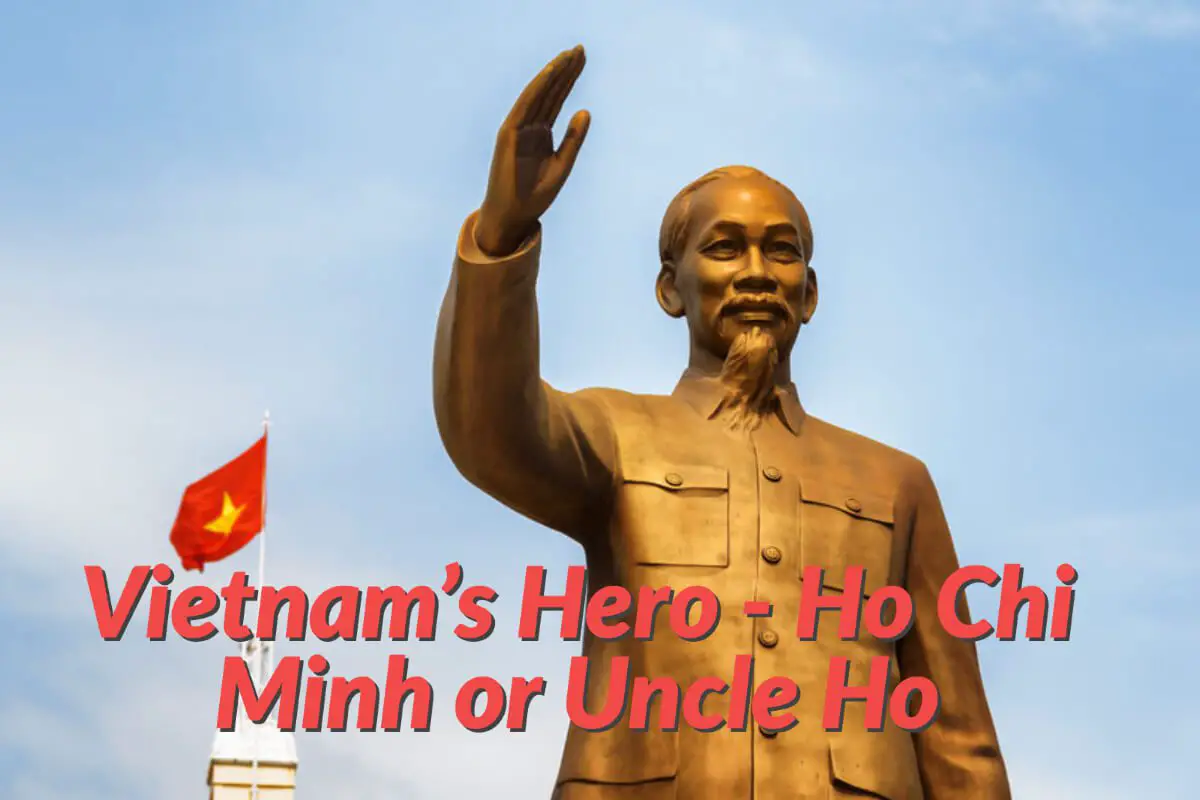Anyone who travels to Vietnam will quickly learn how important the Vietnamese leader Ho Chi Minh is to the Vietnamese people. Vietnam’s largest city was renamed from Saigon to Ho Chi Minh City to honor him.
Ho Chi Minh, also known as Uncle Ho by the Vietnamese, is the founder of present-day Vietnam; he is to Vietnam like President George Washington is to the Americans. Ho Chi Minh spent his entire life fighting for freedom from French colonial rule and then later for the unification of North and South Vietnam. Anyone who studies Ho Chi Minh’s life and legacy will admire all he has accomplished.
Table of Contents
- Top 11 Reasons Why Ho Chi Minh or Uncle Ho Is The Most Important Vietnamese National Hero
- 1 – Ho Chi Minh Was the Founder of Present-Day Vietnam
- 2 – Ho Chi Minh Was A True Patriot
- 3- Ho Chi Minh Gave Up Everything For His Country, Vietnam
- 4 – Ho Chi Minh Loved Vietnam And The Vietnamese People
- 5 – Ho Chi Minh Believed In Freedom For Vietnam
- 6 – Ho Chi Minh Was A Relentlessly Fighter
- 7 – Ho Chi Minh Understood Vietnam Needed To Be Unified
- 8 – Ho Chi Minh Is Known As Uncle Ho
- 9 – Ho Chi Minh Understood Both The East And West
- 10 – Ho Chi Minh Lived A Simple Life
- 11 – Ho Chi Minh Was An Idealist
- Related Content

Top 11 Reasons Why Ho Chi Minh or Uncle Ho Is The Most Important Vietnamese National Hero
Ho Chi Minh, also known as Uncle Ho in Vietnam, is commonly regarded as a Vietnamese national hero. He was an inspirational and essential symbol of Vietnamese freedom who led the fight against French colonialism during the Indochina conflict.
His name invokes respect and admiration, and his vast contributions to modern-day Vietnam are still acknowledged, appreciated, and praised today. From his brilliance in negotiating independence from France to being one of the founding fathers of the Communist Party in Vietnam, Ho Chi Minh is so special.
1 – Ho Chi Minh Was the Founder of Present-Day Vietnam
Ho Chi Minh is the father of the founder of present-day Vietnam. The Vietnamese look upon him as the Americans look upon one of their great leaders George Washington.
Ho Chi Minh is best described as a Vietnamese revolutionary, politician, and leader. Ho Chi Minh adhered to the Marxist-Leninist ideology and established Communist rule in the Democratic Republic of Vietnam.
2 – Ho Chi Minh Was A True Patriot
Ho Chi Minh was a true Vietnamese patriot. He wanted to do what he felt was best for his country. His main goal was Vietnamese freedom from French Colonial rule and unification of Vietnam.
His desire for Vietnam shows in a telegram message he sent to US President Harry Truman dated February 18, 1946; Ho Chi Minh asked the Americans to help the Vietnamese gain independence. Here is what the telegram said.
“On behalf of Vietnam Government and people, I beg to inform you that in course of conversation between Vietnam Government and French representatives the latter require the succession of Cochinchina and the return of French troops in Hanoi (stop)
Ho Chi Minh
meanwhile French population and troops are making active preparation for a coup de main in Hanoi and for military aggression (stop)
therefore I most earnestly appeal to you personally and to the American people to interfere urgently in support of our independence and help making the negotiations more in keeping with the principles of the Atlantic and San Francisco charters. Respectfully Ho Chi Minh”
Ho Chi Minh was interested in the freedom of his people from the French Colonial rule of Cochinchina. As we know from history, President Truman did not help him with this fight for independence, and about 20 years later, America was fighting a very bloody war in Vietnam.
3- Ho Chi Minh Gave Up Everything For His Country, Vietnam
Ho Chi Minh was the kind of revolutionary willing to give up everything for his country. Vietnamese will proudly tell you that he was celibate as he gave us all for the revolution.
The truth is a lot more complicated than that. In 1926, Ho Chi Minh married a Catholic Chinese midwife named Zeng Xueming; she was given the Vietnamese name of Tăng Tuyết Minh. Zhou Enlai’s wife, Deng Yingchao, was a witness at their wedding,
Zeng Xueming and Ho Chi Minh lived together for about a year (1926-1927). They never divorced, and their marriage was never annulled; they had no children. Vietnam never fully recognized her as his wife.
Zeng Xueming spent her life in China; Ho Chi Minh spent his life in Vietnam. Over the years, they both tried to initiate some contact, but it always failed; usually, those they trusted stopped their contact.
This is why most Vietnamese will tell you that Ho Chi Minh never married and was celibate his entire life. The Vietnamese pride themselves in the legend that he lived as a celibate monk, but the truth is much more complicated.
Ho Chi Minh sacrificed a lot for Vietnam; he never had any children or family and spent his entire life fighting for Vietnamese independence.

4 – Ho Chi Minh Loved Vietnam And The Vietnamese People
When I think of Ho Chi Minh, I think about a man who truly loved Vietnam and the Vietnamese people. Ho Chi Minh was willing to give up everything to fight for freedom for the Vietnamese people.
Ho Chi Minh sacrificed all comforts to live in the jungles, in caves, as a guerrilla fighter. This fight lasted not just a few years but his entire life; for any person, that is a huge sacrifice.
Ho Chi Minh was known to say:
“It was patriotism, not communism, that inspired me.”
Ho chi Minh
5 – Ho Chi Minh Believed In Freedom For Vietnam
Ho Chi Minh truly believed in freedom and independence for Vietnam. During his lifetime, most of his focus was on the Vietnamese independence from the colonial French. He wanted to see the Vietnamese be able to rule their own government and decide their own destiny.
The American airstrikes and bombardment of North Vietnam started in 1965. In July 1966, as the North Vietnamese people were suffering terrible losses due to these airstrikes, Ho Chi Minh sent this message to the Vietnamese people:
“Nothing is as dear to the heart of the Vietnamese as independence and liberation.”
Ho Chi Minh
6 – Ho Chi Minh Was A Relentlessly Fighter
Ho Chi Minh was a relentless fighter and revolutionary; he was relentless in fighting to gain full independence and unification for Vietnam.
Ho Chi Minh once told the American journalist Robert Shaplen:
“I am a professional revolutionary.”
Ho chi Minh
This is how Ho Chi Minh saw himself; he understood that he could never give up the fight for the independence that he desired for his country.
7 – Ho Chi Minh Understood Vietnam Needed To Be Unified
Ho Chi Minh understood that the north and south of Vietnam needed to be unified; he understood that the Vietnamese wanted to see their entire country be one and not split into north and south Vietnam.
He could have stopped when the Viet Minh gained full control of North Vietnam, but he understood the Vietnamese people’s minds and hearts and what was important to them.
In speaking of the war with America, Ho Chi Minh said:
“You can kill ten of our men for every one we kill of yours. But even at those odds, you will lose and we will win.”
Ho Chi Minh
Ho Chi Minh never lived to see his dream of the unification of Vietnam. Ho Chi Minh died on 2 September 1969. Vietnam became united in 1975, with the official recognition happening on July 2, 1976.
About 7 years after Ho Chi Minh died, Vietnam was united between north and south Vietnam.
8 – Ho Chi Minh Is Known As Uncle Ho
The Vietnamese call Ho Chi Minh Uncle Ho or Bác Hồ, The term in Vietnamese of Bác means Uncle or Bác Hồ as Uncle Ho. In Vietnamese, calling someone your Uncle is a term of endearment.
The Vietnamese see Ho Chi Minh or Uncle Ho as the father figure of modern-day Vietnam. Uncle Ho shows respect for Ho Chi Minh and his rightful place in the hearts and minds of the Vietnamese people.

9 – Ho Chi Minh Understood Both The East And West
Ho Chi Minh understood and had lived in both the east and west. Besides Vietnamese, he also spoke fluent French, English, Russian and Chinese.
In 1911 at 21, Ho Chi Minh left Vietnam to visit France. During that time, he traveled to New York, Boston, London, and other parts of Europe. He attended the 1919 Paris Peace Conference in Versailles that took place after World War l; during that time, Ho Chi Minh began to promote independence for Vietnam.
His understanding of the east and west gave Ho Chi Minh a unique perspective. He understood how both the east and west worlds worked. He was also able to write directly to world leaders.
Ho Chi Minh was quoted as saying this to the French author Paul Mus:
“When I was young I studied Buddhism, Confucianism, Christianity as well as Marxism. There is something good in each doctrine.”
Ho chi Minh
10 – Ho Chi Minh Lived A Simple Life
Ho Chi Minh lived a very simple life. In Hanoi, you can visit his wooden house near the Ho Chi Minh Mausoleum; even when he was President of Vietnam, he lived in a wooden house facing a small pond.
I have always admired Ho Chi Minh because I believe he was willing to sacrifice and give all for the independence of Vietnam. He preferred to live a simple life.
11 – Ho Chi Minh Was An Idealist
Growing up in the United States, we would hear about Ho Chi Minh as an evil dictator who was our enemy. But as I study Ho Chi Minh and his life, I see him as a man who was the ultimate idealist.
Ho Chi Minh was guided by unification and freedom for Vietnam. When he started on this pursuit, the odds were stacked against him and his Viet Minh fighters.
Ho Chi Minh never gave up on his dream of freedom and unification for Vietnam. He never lived to see the success of his hard work and sacrifice.
Studying and learning about Ho Chi Minh or Uncle Ho’s life, I admire him. As an American, I no longer see him as an enemy but instead as a man who loved his country as much as I love mine.
That is why the Vietnamese see Ho Chi Minh the way Americans view US president George Washington. George Washington wanted independence for America from the British; Ho Chi Minh wanted independence and unification for Vietnam.
Anyone traveling to Vietnam should understand the importance of Ho Chi Minh or Uncle Ho in the lives of every Vietnamese citizen; he is truly loved and revered.
At A Bus On A Dusty Road, we talk about history, travel, life, sailing, and ex-pat living. We are all about “Living Life As A Global Citizen.” We explore social, cultural, and economic issues and travel.
We would love to have you be part of our community. Sign up for our newsletter to keep up-to-date by clicking here. If you have any questions, you can contact me, Anita, by clicking here.
Listen to our Podcast called Dusty Roads. You can find it on all major podcast platforms. Try out listening to one of our podcasts by clicking here.
Subscribe to our A Bus On A Dusty Road YouTube Channel filled with great videos and information
Related Content
What is Marxism?
Marxism is the political, social, and economic theory named after Karl Marx. A major contributor to Marxism was Friedrich Engels. Marx and Engel’s economic theory examines capitalism’s effect on labor, productivity, society, and overall economic development. They believe the relationship between the capitalist or business owners and the workers or laborers is exploitative, and the workers are always at a disadvantage.
You can learn more by reading What is Marxism? The Marxist Thought Explained In Simple Terms by clicking here.
Who Was Confucius, And Why Was He Important?
Confucius was a renowned Chinese philosopher and politician educator. He lived over 2,500 years ago, yet his social and moral beliefs still influence many parts of Asia today. During his lifetime, he had a group of disciples and wrote what is known as the Analects. No other person in China has affected the world as much as Confucius.
You can learn more by reading Who Was Confucius And Why Was He Important? by clicking here.


